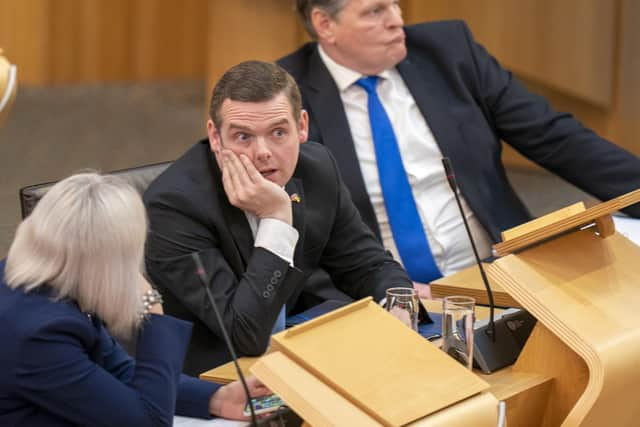Boris Johnson did for the Scots Tories, but not the way Douglas Ross claims - Brian Monteith
In yet a further example of lamentable Scottish leadership Prime Minister Boris Johnson was blamed, but the faults lie much closer to home.
First the result, for those that do not know, the SNP gained 23 councillors nationally, while the Conservatives lost 62. The Liberal Democrats picked up 20 additional councillors, Labour 19 and the Greens 16.
Advertisement
Hide AdAdvertisement
Hide AdAlthough not quite as bad as some opinion polls had suggested, with losses of 100 Conservative councillors being talked of, there is no getting away from it – the Scottish Conservatives were trashed. On national votes and council seats won the Conservatives fell from second place to third, with Labour inching marginally ahead on a first preference vote share of 21.8 per cent to the Conservative’s 19.7 per cent.


In Edinburgh the party suffered its worst result for fifty years, moving from being the largest party with 17 councillors to fifth with only nine, behind not just the SNP, Labour and Liberal Democrats but also the Greens.
In Glasgow the party was reduced to only two councillors, while in Perth the Conservatives moved from being the largest party group to being second behind the SNP after losing three councillors.
Before I give my thoughts on what the election results tell us it is worth stating what they don’t say – nothing has changed at Holyrood, the Conservatives remain second and the official opposition to the SNP. This was not a Scottish Parliament election it was a local election and its outcomes are influenced by a number of variables such as the large number of independent candidates that win seats (152 on a first preference vote of 8.4 per cent) and a lower turnout of 43.7 per cent compared to 63.5 per cent for Holyrood.
If there is a silver lining to all of this it is that yet again the result showed there is no appetite for a second referendum on independence nor is there any obvious majority for breaking up the United Kingdom. Former first minister, Jack McConnell has noted that, excluding independents, the vote share of Leave the UK parties was 45.6 per cent against the Remain in UK parties 54.4 per cent - where we were in 2014.
I wrote a few weeks back the results would be determined in part by how well the parties could get their vote out and I believe that has been borne out, with the SNP motivating their supporters to vote while the Conservatives have clearly struggled.
The question has to be asked, why has it been so difficult to encourage Conservatives to vote? After all, the SNP has been in power for 15 years, its record in Holyrood and in the councils it has run has been, by any yardstick, abysmal. With the combination of the SNP government delivering its own Scottish austerity on councils, and SNP councillors meekly accepting of the cuts there was huge scope to appeal for change.
The Scottish Conservatives have moved into third place not because of the Prime Minister breaking his own rules but because they are simply not doing a good enough job as opposition to the SNP government.
Advertisement
Hide AdAdvertisement
Hide AdWorse than that the Scottish Conservatives have been supporting the SNP and Labour narratives attacking their Government – which only discourages potential Conservative voters without making any converts to their cause. Why choose Conservatives when you can get SNP or Labour to attack the prime minister? It was folly to go blue-on-blue and attack the prime minister calling for his resignation, the issue of his behaviour could have been left while investigations were held but instead there was a rush to charge ahead and present the Scottish Conservatives as something else.
What Conservative voters were looking for was surely a focus on the SNP scandals that affect Scots every day of their lives.
This could have been tied into the elections by majoring on the cuts to local government, the shambles that are the cities the SNP runs and the intentional shift to a centralised Scottish state run from Edinburgh. There was a great deal to attack on but the Conservative leader Douglas Ross chose to start with attacking Boris only to compound his error by later reversing his position. The outcome was that Douglas Ross’s judgement was brought into question.
The problem for the Scottish Conservatives is that its position as second in Scotland to the SNP has been built on the central message of stopping a referendum. It has won support as being more trusted than Labour to not cut a deal with the SNP. It has not been the Conservative Party of old that has triumphed, offering business-like competence, small government, lower taxes, more limited but better public services – no, it has essentially been the best “unionist” party.
At each election that came along, be it a general election, Holyrood election or even a council election the threat of a referendum was used as the encouragement for voters to get out and support Ruth Davidson or Douglas Ross. It worked as a means of usurping Labour, but by denying a referendum will happen Boris Johnson has killed the Ross-Davidson unique selling point and left the party exposed as having little else to offer.
Conservative supporters want Conservatives to vote for. It does not matter if the Douglas Ross-Ruth Davidson double act resigns or is removed if the party does not change its ways. Until it becomes recognisably Conservative and actually has policies that offer an alternative the public will have no reason to vote for it and it will face returning to the 13 per cent support it enjoyed under Annabel Goldie.
Brian Monteith is a former member of the Scottish and European Parliaments and is editor of ThinkScotland.org